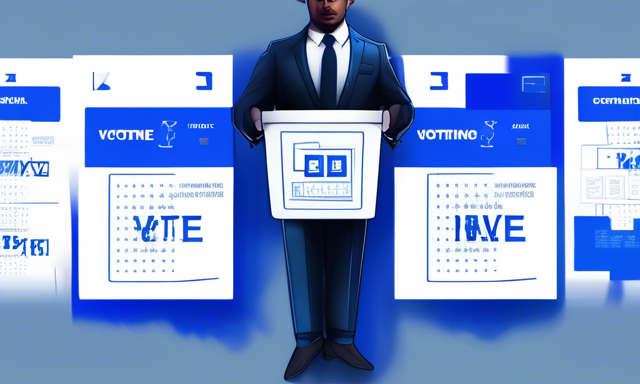Exploring the Future of Voting: The Impact of Blockchain Technology 🌍🗳️
This year is significant for global elections, with over 100 nations poised to cast their votes in 2024. However, the integration of artificial intelligence and the spread of digital misinformation have raised concerns regarding the reliability of traditional voting systems. These issues are particularly evident in methods such as vote-by-mail systems, prompting a shift towards alternative solutions.
A recent survey conducted by the Public Affairs Council indicates a troubling perception among Americans regarding the integrity of upcoming elections; only 37% expressed confidence that the elections would be conducted honestly and transparently. This sentiment underscores broader challenges facing electoral processes worldwide and the pressing need for reform.
Blockchain Solutions for Election Security 🔒
Amidst diminishing trust in conventional voting techniques, electronic voting systems—especially those leveraging blockchain technology—are gaining traction as potential remedies. Recent analysis suggests the electronic voting market, valued at around $3 billion last year, could escalate to $10 billion by 2032 due to hybrid voting models that fuse traditional methods with blockchain infrastructures. Such models are anticipated to significantly enhance security, transparency, and verifiability.
According to business insights, the escalating incorporation of blockchain in Electronic Voting Systems (EVS) stems from its ability to provide secure, tamper-proof records through cryptographic verification and decentralized consensus mechanisms. These features effectively tackle threats of fraud and manipulation, addressing longstanding concerns around election integrity.
Initial Ventures in Blockchain Voting 🚀
Currently, while blockchain voting is still emerging, platforms like Voatz exemplify its potential. This mobile voting solution utilizes blockchain to bolster voter security and authentication. Voatz has been instrumental in facilitating voting for military personnel and citizens residing abroad, enabling them to request and submit ballots securely via their smartphones.
Voters are authenticated through biometrics or secure PINs, and once they cast their votes, anonymous receipts are created to confirm their choices. The information is then stored on the blockchain across distributed servers, ensuring that it cannot be tampered with. Voatz also prioritizes privacy by employing zero-knowledge proofs, thereby maintaining voter anonymity and aligning with the expectations of conventional voting.
A landmark moment occurred during Mexico’s 2024 Federal elections, where Voatz allowed expatriates to vote via smartphones for the very first time. This development underscores the scalability and relevance of blockchain voting solutions in modern electoral processes. Moreover, Voatz has been adopted in several U.S. municipalities and statewide elections, signaling a growing acceptance of technology in governance.
Enhancing Voter Identity with Decentralized Models 🔍
Decentralized voter identification frameworks are also emerging as a viable solution to secure voter identity verification. According to Ingo Rübe, CEO of the KILT protocol, verifiable credentials on the blockchain hold the promise of addressing critical concerns related to voter identity control. This approach minimizes risks like double voting by providing secure verification processes.
Decentralized IDs (DeIDs) function as digital voter licenses, allowing individuals to validate their eligibility while ensuring their privacy remains intact. Although challenges persist, pilot projects and experimental initiatives are actively exploring the incorporation of DeID into verified voting systems.
Securing Election Documents with Blockchain 🗂️
Blockchain isn’t just being used for voting; it also plays a vital role in safeguarding important electoral documents. Rafael Cordon, co-founder of Simple Proof, highlighted how blockchain technology can secure document integrity by creating unalterable records. Notably, Guatemala utilized Simple Proof during its previous elections to protect over 125,000 essential election documents. This approach helps counteract potential allegations of document tampering and reinforces transparency during the vote tallying process.
Citizens can independently verify the authenticity of election documents via timestamps on the blockchain, fostering transparency without compromising individual vote secrecy. Despite being relatively new, initiatives like Simple Proof are generating interest among governments aiming to bolster election reliability amidst concerns of misinformation.
Challenges Ahead for Blockchain Voting Systems ⚠️
While the promise of blockchain voting systems is substantial, various challenges remain. Issues such as the accessibility of these systems can significantly affect voter turnout and overall election integrity. For example, certain states have lax voter ID requirements and allow same-day registration, complicating the integration of blockchain solutions.
Furthermore, the complexity of blockchain technology can hinder user adoption, raising concerns that the barriers introduced may deter participation. Skepticism about the relationship between blockchain and cryptocurrency also complicates public acceptance, making it crucial for stakeholders to clarify the advantages of blockchain in electoral contexts.
Hot Take: The Path Forward for Blockchain in Elections 🔮
The integration of blockchain technology into electoral processes presents a transformative opportunity to enhance security and transparency. However, overcoming the hurdles associated with implementation and public perception will be critical in realizing its full potential. As governments and tech providers explore blockchain solutions, the path forward will involve careful consideration of user experience, accessibility, and public trust.
Through continued collaboration and innovation, blockchain could ultimately reshape the landscape of voting, paving the way for a more reliable electoral future.
For further insights, you can explore [business research insights](https://www.businessresearchinsights.com/market-reports/electronic-voting-system-market-112833) and [open timestamps](https://dgi.io/ots-tutorial/).





 By
By
 By
By

 By
By
 By
By